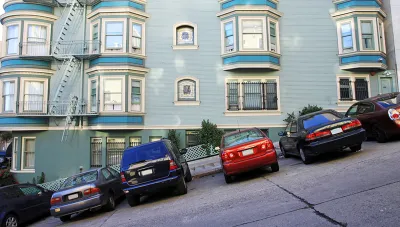Transportation and affordable housing advocates advocate unbundling parking from housing to provide an incentive to own fewer vehicles while reducing housing costs and increasing supply. But should parcel taxes be applied to parking spaces?

San Francisco Chronicle metro columnist C.W. Nevius writes about a surprise bill an unsuspecting San Francisco schoolteacher living in an affordable one bedroom condo (purchased through "the city’s Inclusionary Housing Below Market Rate Ownership Program") received: not one but two school district parcel taxes, each for $259. His parking space was billed as well as his condo.
Since the parking spot was sold separately it has its own deed, which is now a common practice among developers. That means he is considered to have two parcels.
Is it "unfair taxation" as Nevius claims? After all, if homeowners knew that they would have to pay an additional parcel tax on their parking space(s), would it not provide further incentive to own fewer vehicles? In addition, parcels devoted to parking could have been used to provide sorely needed new housing in the City by the Bay.
Or is Nevius on to something? According to an earlier post, "Unbundling Parking Costs to Keep Families in Cities," the practice itself, rather than whether one chooses to rent or own a parking space (and pay separately for it) is what advocates want.
While the homeowner was unable to get an exemption from the school district for paying the parcel tax on his parking space, Nevius points to a precedent set by City College of San Francisco that refunded the parking space parcel tax after a new financial officer determined that "the double dip was unfair".
From Smart Growth America's "Smarter parking codes to promote smart growth" (summarized here):
“Unbundling” purchase of housing units from purchase of car parking: Private vehicle parking spaces must be priced and sold separately from the rental or purchase of dwelling units. This lets the household decide if they would like to take on the expense of a parking space, as opposed to that parking cost automatically being bundled into the lease or sale price.
This makes housing more affordable because households can opt to forgo the cost of a parking space if they don’t need it. This policy works particularly well when the multi-family building is near transit or in a place where owning a car is not as critical to quality of life.
FULL STORY: 2 property tax bills: 1 for condo, 1 for parking space

National Parks Layoffs Will Cause Communities to Lose Billions
Thousands of essential park workers were laid off this week, just before the busy spring break season.

Retro-silient?: America’s First “Eco-burb,” The Woodlands Turns 50
A master-planned community north of Houston offers lessons on green infrastructure and resilient design, but falls short of its founder’s lofty affordability and walkability goals.

Delivering for America Plan Will Downgrade Mail Service in at Least 49.5 Percent of Zip Codes
Republican and Democrat lawmakers criticize the plan for its disproportionate negative impact on rural communities.

Test News Post 1
This is a summary

Test News Headline 46
Test for the image on the front page.

Balancing Bombs and Butterflies: How the National Guard Protects a Rare Species
The National Guard at Fort Indiantown Gap uses GIS technology and land management strategies to balance military training with conservation efforts, ensuring the survival of the rare eastern regal fritillary butterfly.
Urban Design for Planners 1: Software Tools
This six-course series explores essential urban design concepts using open source software and equips planners with the tools they need to participate fully in the urban design process.
Planning for Universal Design
Learn the tools for implementing Universal Design in planning regulations.
EMC Planning Group, Inc.
Planetizen
Planetizen
Mpact (formerly Rail~Volution)
Great Falls Development Authority, Inc.
HUDs Office of Policy Development and Research
NYU Wagner Graduate School of Public Service





























